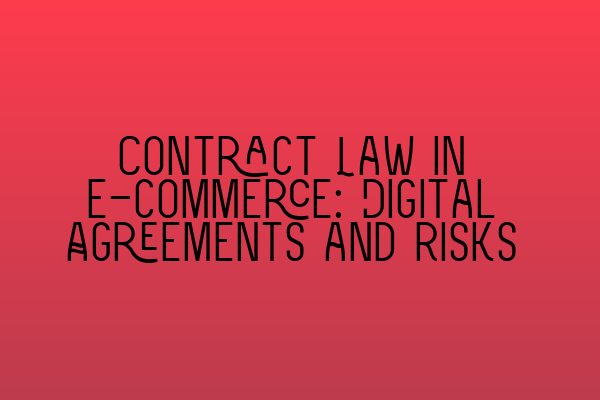Contract Law in E-commerce: Digital Agreements and Risks
In today’s digital age, e-commerce has become an integral part of our daily lives. From buying groceries to booking vacations, people are increasingly turning to online platforms to meet their needs. As a result, the concept of contracts in the digital landscape has gained significant importance. In this blog post, we will explore the world of contract law in e-commerce, specifically focusing on digital agreements and the associated risks.
Digital agreements, also known as electronic contracts, are contracts formed and executed electronically. These agreements are legally binding, just like traditional paper-based contracts. However, they come with their own unique set of challenges and risks. Let’s delve deeper into some key aspects.
1. Formation of Digital Agreements:
The formation of a digital agreement may vary depending on the jurisdiction and the nature of the transaction. Generally, there are three essential elements for the formation of a valid contract: offer, acceptance, and consideration. In e-commerce, these elements can be met through various means, such as clicking on an “I agree” button or signing electronically using a digital signature. It’s important to ensure that the process of forming a digital agreement follows the legal requirements of the applicable jurisdiction.
2. Online Terms and Conditions:
One of the critical components of digital agreements is the inclusion of online terms and conditions. These terms govern the rights and obligations of the parties involved in the e-commerce transaction. It is essential to make these terms easily accessible and clearly communicate any limitations or liabilities. By implementing user-friendly and transparent terms and conditions, businesses can reduce the risk of disputes and ensure a fair and harmonious relationship with their customers.
3. Consumer Protection and Data Privacy:
E-commerce transactions often involve the collection and processing of personal data. Businesses must comply with data protection laws and ensure that the necessary safeguards are in place to protect consumer information. Additionally, consumer protection laws play a crucial role in e-commerce, especially when it comes to issues such as warranties, refunds, and cancellations. By staying abreast of the latest regulations and implementing robust privacy measures, companies can build trust and credibility with their customers.
4. Electronic Signatures:
The use of electronic signatures has revolutionized the way contracts are executed in the digital world. An electronic signature is a digital representation of a person’s intent to be bound by a contract. It offers convenience, time-efficiency, and security. However, it is essential to understand the legal validity of electronic signatures in different jurisdictions and comply with the applicable laws to ensure enforceability.
5. Risks and Dispute Resolution:
As with any contract, digital agreements are not immune to risks and potential disputes. Issues may arise regarding the interpretation of terms, non-performance, or breach of contract. When disputes occur, parties can resort to dispute resolution mechanisms such as negotiation, mediation, or litigation. It is crucial to include carefully crafted dispute resolution clauses in digital agreements to minimize the chances of protracted and costly legal battles.
In conclusion, contract law in the e-commerce realm is a complex and evolving field. Digital agreements present both opportunities and risks for businesses and consumers alike. By understanding the formation process, implementing clear terms and conditions, prioritizing consumer protection and data privacy, utilizing electronic signatures, and addressing dispute resolution, businesses can navigate the e-commerce landscape with confidence and mitigate potential legal risks.
If you found this article informative, you may also be interested in exploring related topics such as:
– Barrister vs. Solicitor: A Comprehensive Comparison
– Exploring Different Solicitor Specializations: Finding Your Niche
– Embracing the Rise of Virtual Law Practices
– Unveiling Real-Life Case Studies: Insights into Legal Practice and Decision-Making
– Exploring Solicitor Salaries in the UK: Average Earnings and Factors Affecting Income
For more information and legal expertise in contract law and e-commerce, contact SQE Contract Law, your trusted source for solicitor services.
